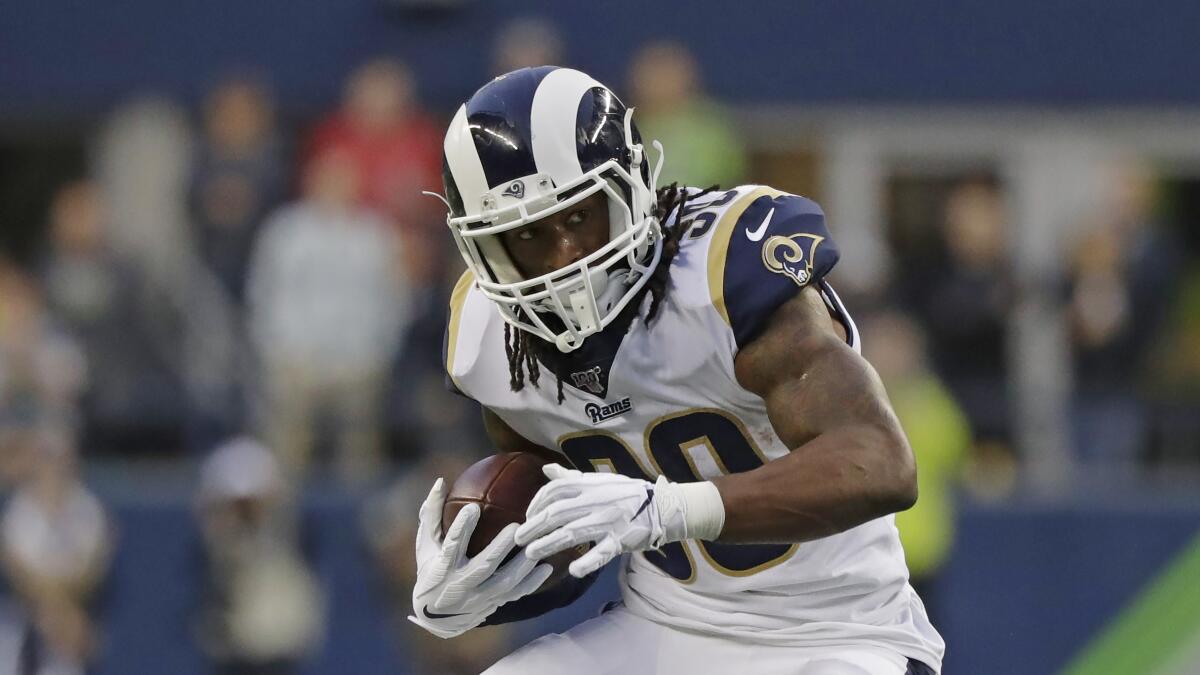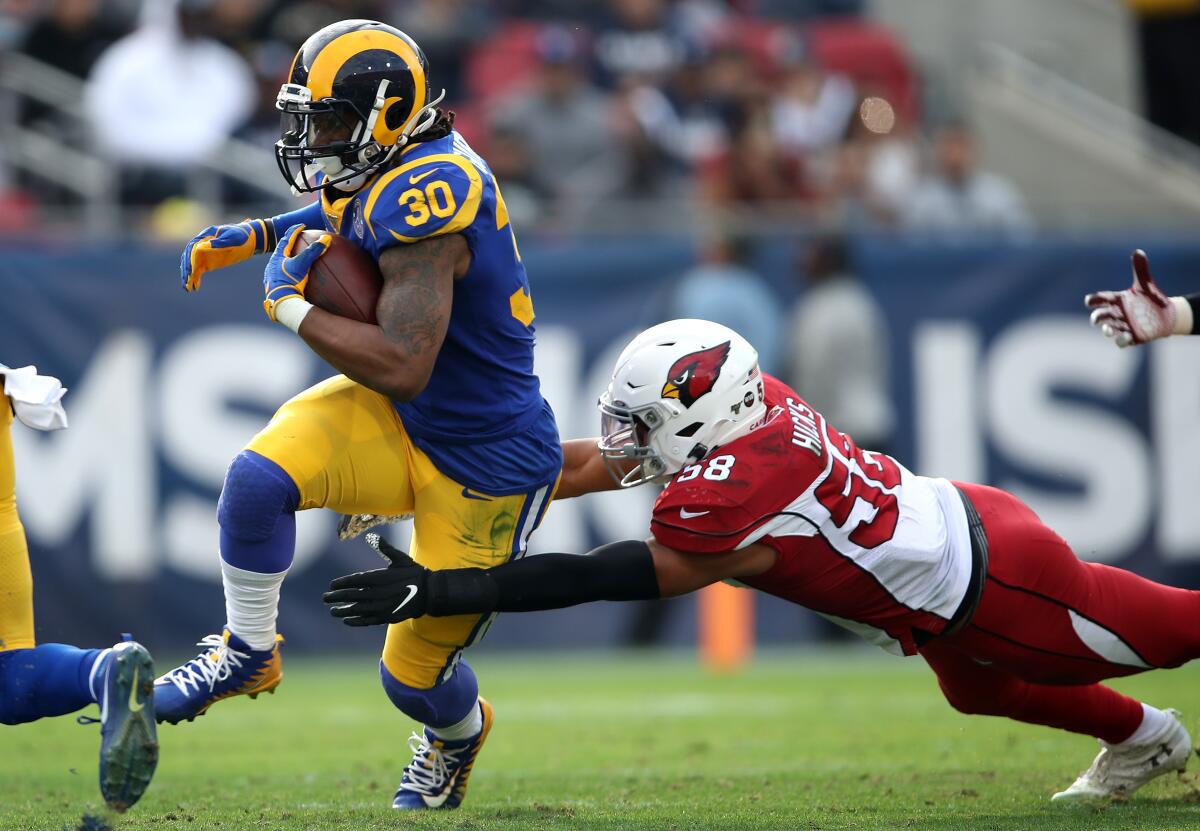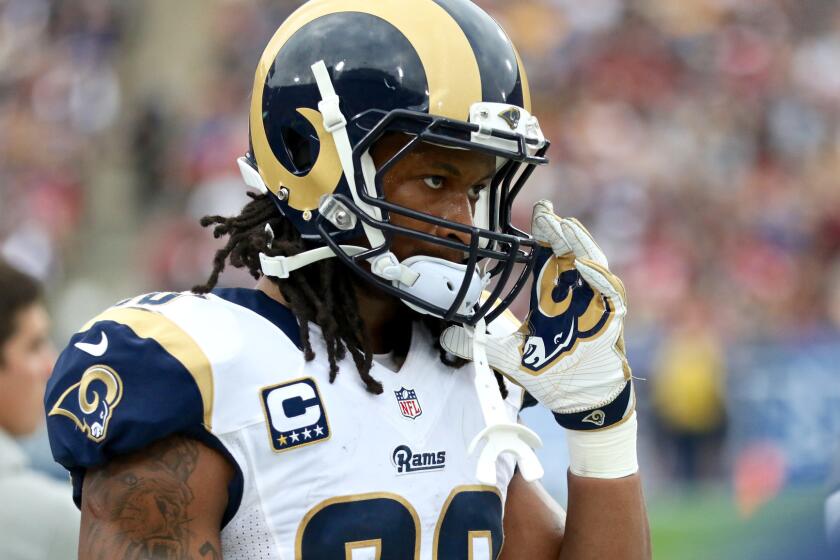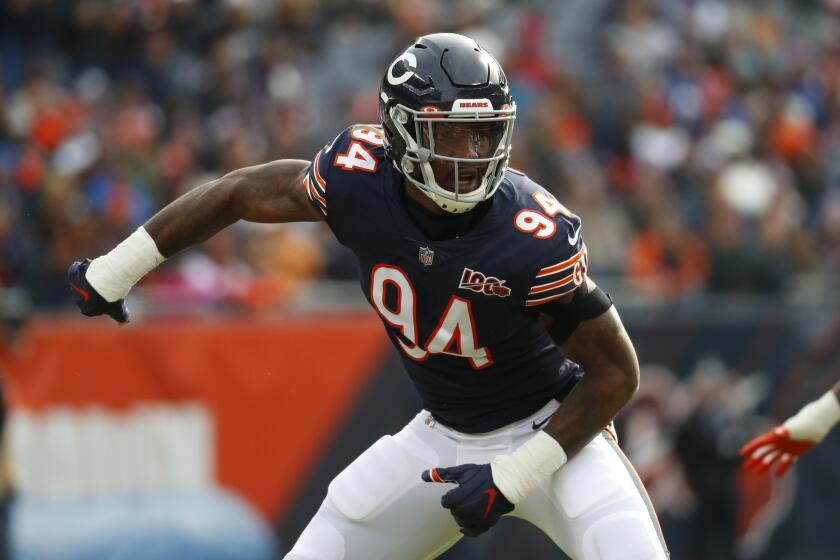Rams needed to sign Todd Gurley to a big deal in 2018; they needed to cut him in 2020

- Share via
He arrived as Tinseltown’s big star, the leading man in the most ballyhooed local sports premiere of this generation.
He wound up, like so many failed dreams, on the cutting-room floor.
Four years after triumphantly leading the Rams back to Los Angeles, two years after signing one of the richest contracts for a running back in NFL history, superstar Todd Gurley has been officially treated like the last guy on the junior varsity bench.
He was cut.
Think about that.
The great Gurley, the hurdling hellion, just two seasons after being named NFL offensive player of the year.
Whacked, canned, axed.
He wasn’t traded, because the Rams couldn’t trade him. He wasn’t sent to the minor leagues, because there are no NFL minor leagues. He wasn’t going to retire because he’s only 25.
“Damn I got fired on my day off,” Gurley tweeted with a laughing-so-hard-it’s-crying emoji.
Todd Gurley, a three-time Pro Bowl pick who less than two years ago signed one of the largest contracts ever for a running back, was cut by the Rams.
Yeah, that’s exactly how it went down Thursday. Dude got fired, fans tearfully laughing in amazement and perhaps wondering what they’re missing. Why did an organization invest so much money in something that can become so expendable so quickly? Why eat millions of dollars in real money and cap space to get rid of him? How exactly does that happen?
It turns out, two things happened, neither of which can be blamed on either the Rams or Gurley.
The dazzle of football happened. The danger of football happened. The two things collided and created an unholy mess.
The Rams will be criticized for giving Gurley that record $60-million contract despite already having him under team control for two more years, but they needed him to sell pro football in their new city and tickets to the Coliseum. By signing him, they showed a largesse that we had not seen in the Dodgers, and an all-in commitment to winning that had been lacking in the Lakers.
Don’t blame the Rams for going for it. The Gurley contract was a dazzle contract at a time when dazzle was desperately needed, and it almost worked, as Gurley put them in position to play in the Super Bowl, where their title hopes were alive until the final minutes.
Of course, Gurley was virtually absent in that Super Bowl as well as the NFC championship game against New Orleans, and this is where the relationship was wrecked by football’s danger.

His surgically repaired left knee, while never publicly diagnosed with new damage, had suddenly robbed him of the speed and agility that made him Todd Gurley. By the end of that 2018 season, he wasn’t the same player, no matter how much coach Sean McVay tried to cover for his ineffectiveness and lack of usage.
Last season, the public distraction over Gurley’s declining skills and playing time became an internal disruption. The Rams needed him, but couldn’t count on him. Yet he was viewed as such a team cornerstone, the Rams couldn’t tell the public they couldn’t trust him.
The resulting disconnect led to incidents like the infamous time McVay called himself an “idiot” for not running Gurley more often ... and Gurley wouldn’t disagree with him.
In the end, the Rams could no longer base their offense on Gurley, as he ranked 37th in the league at 3.8 yards per carry. They could no longer count on winning with Gurley, as he was the league’s 20th-ranked running back without a single 100-yard game.
Several months ago it was written in this space that the Rams needed to trade him. But considering his contract and injuries, that was always going to be a long shot . When the COVID-19 pandemic restrictions prevented other teams’ doctors from flying him anywhere for a physical, any potential deal surely became an impossible task.
But the Rams still couldn’t keep him around. He had become the elephant in the room, his lack of usage and unknown physical condition leading to questions in every news conference. He wasn’t getting any stronger, and the situation wasn’t getting any calmer, and it just wasn’t working.
Gurley had also become a reluctant public figure, far from the Hollywood star that the Rams once imagined. Releasing him was not like the Angels suddenly firing Mike Trout, or the Dodgers instantly canning Clayton Kershaw. The private Gurley was not particularly ingrained in the community, and the Rams risked little public outcry by making this move, other than from folks who are saying they were dumb to sign him to such a rich deal in the first place.
Les Snead, the Rams’ general manager, offered a hint of the club’s position in his December postseason news gathering when asked if Gurley was the same running back as in the past.
“This year he wasn’t,” Snead said.
When he was asked if any player beyond Aaron Donald and Jared Goff was untouchable, he also offered a hint.
“I don’t want to get into that … because it can be misconstrued in so many ways,” Snead said.
Rams lose edge rusher Dante Fowler and replace him with Leonard Floyd while they re-sign Andrew Whitworth and sign A’Shawn Robinson.
The Rams cut Gurley specifically on Thursday to save $10.5 million in bonus and injury guarantees, but the cost of chasing the dazzle will run deep.
They will be restricted in their acquisitions for at least another season because of the cap space still eaten up by Gurley’s contract. They don’t have a first-round draft pick for the next two seasons because of the trade for cornerback Jalen Ramsey. With no lead running backs on the roster, their offense will rely completely on the inconsistent Goff, who struggled under that same burden last year.
For reasons including the salary cap, their defense has lost veterans Michael Brockers, Dante Fowler, Cory Littleton, Nickell Robey-Coleman and just-released Clay Matthews. They’ll need to reach deep into the wallet if they want to keep Ramsey beyond this season.
It will be a refurbished Rams team that marches into their new SoFi Stadium, a bit unsettled, somewhat unfamiliar, sort of strange. The guy who was supposed to lead them will be gone, Gurley’s Rams career having quickly run the gamut, this benefactor of football’s dazzle also ultimately a victim of its danger.
The Rams had to pay him. And the Rams had to cut him.
More to Read
Go beyond the scoreboard
Get the latest on L.A.'s teams in the daily Sports Report newsletter.
You may occasionally receive promotional content from the Los Angeles Times.









